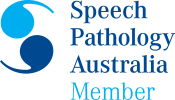On visiting a speech pathologist, the session often starts with a discussion around the area of concern, whether it is regarding speech, language, literacy, voice, stuttering or swallowing. Once you have established what your concerns are, there are a few key components that a literacy assessment is composed of including:
Case History
This includes any background history such as any developmental concerns; both physical and mental, or family history of literacy difficulties such as dyslexia. The clinician may also ask for some background information about the individual’s speech and language skills. This is because often an individual’s speech and language ability affects their literacy skills. This is due to the importance of sound production in spell and read words as well as the ability to comprehend and put together a sentence in order to read or write a passage. The speech pathologist may have to conduct a speech and language assessment in addition to the literacy assessment, if they feel that deficits in this area may be underpinning the literacy concerns brought forward.
Phonological Awareness test
This test is done to determine if the individual is able to identify and manipulate sounds within a word. This is important for accurate reading and spelling. Individuals that struggle with phonological awareness may spell words like ‘splash’ as ‘slpash’ as they are not able to process the sounds within the word.
Decoding and encoding test
These are tests of single word reading and spelling. This often includes both words that can be sounded out phonetically as well as sight words. This highlights whether the individual has a good understanding of which sounds correspond to which letters or letter groups. Individuals that struggle with decoding or encoding may not understand that the ‘aye’ sound in the word ‘stain’ is represented by the ‘ai’ group of letters.
Reading comprehension test
This component of the assessment picks up higher order literacy difficulties. An individual may be able to sound out the letters to form the words, however they may struggle to process the words together as a sentence, fail to gather the main idea, hold on to key information within the test or fail to understand the implications of the text and make predictions from it.
Written language assessment
This component assesses the individual’s ability to put together a written piece such as a narrative or a persuasive. Individuals who struggle to write sentences, follow a logical written order or structure as well as those that struggle with punctuation will have difficulties with this component of the assessment battery.
After the assessment has been completed, your speech pathologist will provide you with the results, which will include a diagnosis and recommendations about which treatment programs would best suit the individual. Each diagnosis is different and based on the individuals presenting symptoms, which guide the type of therapy provided. For this reason, it is essential a literacy assessment is conducted by a qualifies speech therapist prior to commencing therapy.
Contact us for results focused on speech therapy
This article was written by our Speech Pathologist Ashleigh Fattah who is a Speech Pathology Australia member. If you have speech pathology related questions, make an appointment. We‘ll provide you with simple and effective therapy targeted to your concerns. Contact us today.
The post What to expect in an initial literacy speech pathology assessment appeared first on ENT Wellbeing Sydney.










